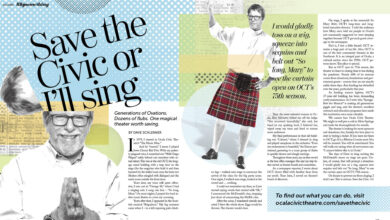The still of the night feigns its slumber, a masquerade for the torrent of quiet industry hidden from the multitude of somnophiles who flee to their warm enclaves. The darkness does not merely settle in where light has retreated, it devours it and with it all pretensions of a day’s final demise, belying its lifeless façade.
It is here, soon after the post meridiem surrenders to the ante, that the expectation of the interim societal coma proves to be but a myth. Churning within is a potent commerce, rife with all the cogs of production grinding in seeming perpetuity. And there to administer the manufactures are people, human beings of the nocturnal sort, toiling in the witching hours before withdrawing to their own stupors as light begins to hold sway.
To the vast populace unaware of this hive in the darkness, the world of the a.m. would seem the domain of freaks and ghouls, but they would be wrong. For in this crepuscule chill are truck drivers hauling their payloads across the highways and byways, modern cowboys of the industrial herd; doctors and nurses tending to those victims stricken in the most vulnerable of hours; and, of course, the lads stocking the shelves of the grocery store all for the convenience of the diurnal, blithely unaware of their efforts.
We wake up daily to a world that for 12 hours is in the custody of those who work “the graveyard shift.” They man their posts while cultivating a peculiar lifestyle that includes the sleep cycle of coyotes and owls. And the social life of the “graveyard shift” employee? Tenuous at best, but few complaints
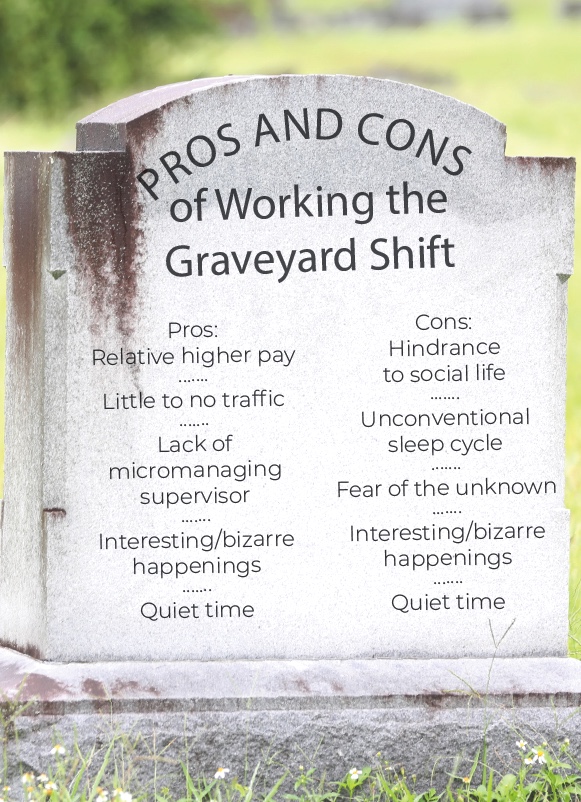
The night watch
“I have a front row seat to the greatest show on earth,” said Christopher Russo, a veteran officer of the Ocala Police Department and now in his third year patrolling the night shift. “Being from New York, I’m from the ‘City that Never Sleeps,’ and when I came to Ocala everyone said, ‘You’re moving to Slow-Cala.’ Once I got on nights (shift), I learned really fast that Ocala doesn’t sleep, either.”
Russo’s shift starts at 7 p.m. and ends at 7 a.m., rendering his daylight hours spent mostly in bed. Days off and vacations present opportunities for “normalcy,” but there is always an acclimatization process that must take place before returning to the beat.
“If I have to stay up normal hours on my off days, even if I get good sleep, my body is yelling at me, saying, ‘Hey, you’re supposed to be sleeping – it’s 2 o’clock in the afternoon!’ That re-set is super hard.”
The freaks and ghouls feared by those who prefer their beds at midnight are a rare sighting, but exist they most certainly do, and encounters generally include an officer of the law. For Russo, the stories of strange behavior guided by the light of the moon have piled up in three short years.
One evening, Russo feared there may be a chainsaw massacre in the offing when he received a call to the Ocala downtown square at 4:45 a.m. Prepared for the worst, Russo encountered a man indeed walking downtown and revving the motor of his chainsaw.
“He wasn’t threatening anybody, but walking around and yelling, ‘Does anyone want to see my chainsaw?’” Russo recalls. “It didn’t even have a chain on it, and he was excited to show it to me – he wanted to tell me how it was a one-of-one vintage chainsaw. I don’t believe he was on any drugs at the time and the chainsaw wasn’t stolen.”
Getting the call that a man is wielding a chainsaw is enough to get one’s adrenaline going, but that is part of the allure of being a cop, especially one that works the night shift and will encounter things that go beyond strange.
“The calls we’re going to at night are things that are in progress most of the time, so it’s more exciting for me at least,” Russo said. “You don’t know what’s around the corner, and that keeps me on my toes. You get that feeling of ‘what goes bump in the night’ you don’t really know because you can’t see – it’s a little more eerie at night.”
The a.m. hours seem pregnant with aberrant behavior and must be dealt with by more than just the men in blue. Even a warehouse worker tends to keep one eye on the door, not knowing what may lurk from the shadows of a dead calm morning. Wilfred Forde, an advisor on the late-night shift at the AutoZone distribution center in Ocala, can attest to the oddities that come strolling in from behind the dark curtain of the night.
One early morning during Forde’s graveyard shift, a strange man walked into the warehouse, which is generally secure with an officer on duty. “He came in through the drivers’ door, no shirt on, no shoes on, just walking through the warehouse screaming,” Forde recalls. “Everybody thought it was a driver at first coming in to get his paperwork. But no, he was some outside person who got on the property. He finally walked right out the front door.”
Dealing with the unhinged may be the exception to the rule. One would expect a police officer to occasionally come across the eccentric and unpredictable, but for the rest of the graveyard shift workers not in a hospital, interactions such as those aforementioned are fairly rare.
Dania Williams works as a night auditor at the Equus Inn and is yet to experience anything beyond late-night revelers.
“Fridays and Saturday nights we’ll get drunk people coming from the bars downtown,” Williams explained. “As far as stuff out of the ordinary, I haven’t seen any, but you do get some weirdos sometimes; it’s not frightening, more irritating.”
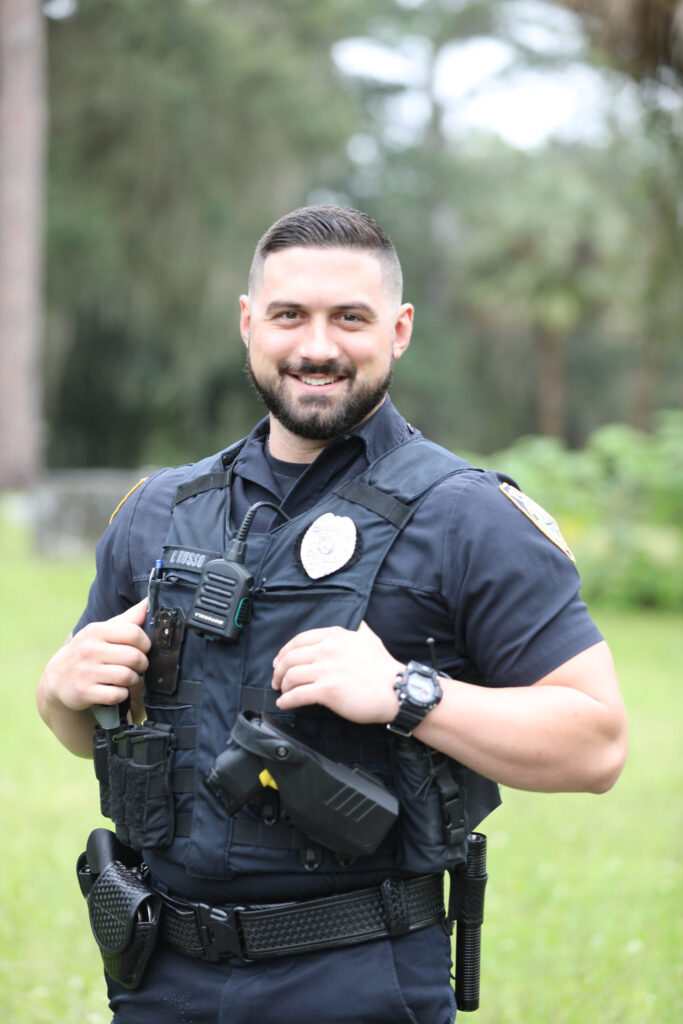
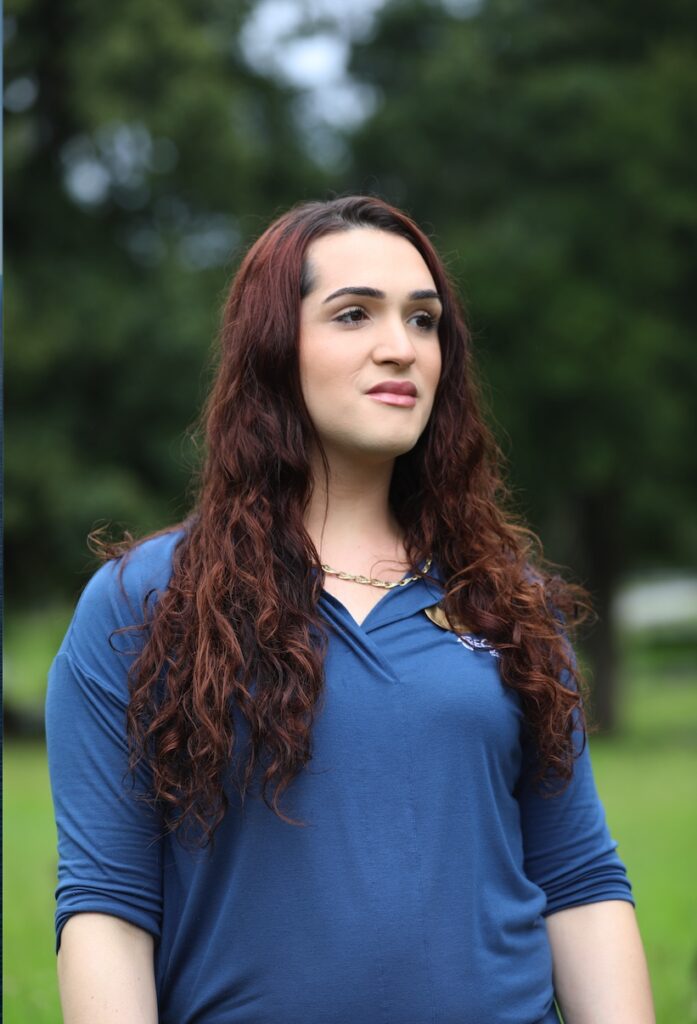
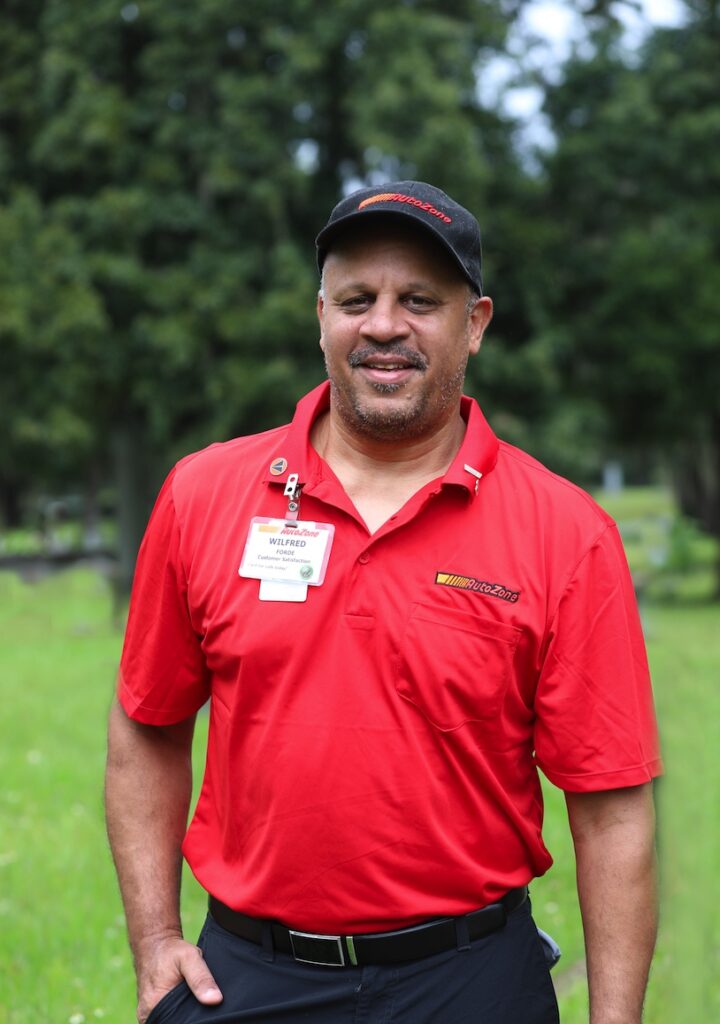
Sleep cycles and social disconnect
The spookiness or potential dangers aside, workers of the graveyard shift face mainly the issues of unconventional sleep cycles and a lifestyle that hinders significant social interaction. To work the flip side of the time clock means either owning the night owl gene or simply grasping the best available work option. Either way, the advantages of working a graveyard shift may ultimately outweigh the disadvantages.
Those disadvantages seem mostly to center around a major adjustment to sleeping habits.
“My first graveyard shift was the absolute worst,” Williams said. “I was not prepared for it. I was like, ‘Oh, I’ve got this – I usually stay up to 2 or 3 o’clock in the morning anyway – this is nothing. I get halfway through the shift and I almost pass out; I’m ready to go night-night.”
Williams has since adjusted, but she is a newbie compared to Forde, who has worked the graveyard shift for 20 years, at AutoZone now and for Cheney Brothers before that. In those 20 years, Forde has enjoyed a successful marriage and raised a family of four children, the youngest now age 23. He started the graveyard shift not out of some innate desire to do so, but because the money was good. He and his wife made the necessary adjustments and the formula has paid dividends.
“It started because my wife was working days and we were raising kids,” Forde said. “It was easier for us, for one to have a job during the day time and the other to have a job at night, so there was always somebody with the kids.
“I started out on nights as a selector because it paid so much. I was averaging almost $40 an hour selecting pieces at Cheney Brothers.”
One does not remain on the graveyard shift for 20 years without experiencing some benefits. Sure, the money was good and there were familial advantages as well, but other aspects gave the night shift strong appeal.
“Basically, you’re almost in charge of everything because there’s no upper management there on your shift,” Forde said. “You have pretty much the full reign. It’s a little bit less stress on you because you don’t have as many people giving you advice on what to do and changing up stuff.”
Then there is the commute, which Forde says is far more relaxing than that experienced by the rush-hour traffic crowd. In all his years, he has not had to sit still in traffic waiting for a light to change. On his way home, he gets to witness the early commuters begin their battle coming from the opposite direction.
At the hotel in the middle of the night, matters are quiet, perhaps too quiet, according to Williams.
“There’s very little interaction with people,” Williams said. “I am a people person and I love interaction. I was originally hired for night audit because that was all they were originally hiring for – you got to get in where you fit in.
“If you’re a people person and like to be active all day, the night audit is not for you. If you prefer a nice, smooth, quiet and easy slow-down shift at work then night audit is for you. It’s the most relaxed shift and it’s repetitive. If I could change anything, it would be more people coming in.”
The social disconnect for now does not worry Russo, but he understands the future will likely dictate a change in his shift. As a young single who likes to play golf with his buddies on off-days, caring for a family does not enter the equation. But he knows that his life will ultimately take him in another direction, and when it does, that could mean the end to the graveyard shift.
“I do worry about my social life – I’m a social guy,” Russo said. “I like to have friends and I think it’s super important for a cop to have a life outside work. So, it gets tough.
“I think that will all change once I start a family and there’s another person in the picture or I have kids. I think I’ve got a few more years in me on the night shift until I think about going to days.”
For a young man, the night shift has presented Russo with some opportunity for levity the way working the day shift likely would not. One dark early morning when on patrol at Six Gun Plaza, he noticed a shadowy figure standing in the parking lot behind one of the buildings.
“I was a little freaked out because he wasn’t moving,” Russo said. He flashed his bright lights onto the figure, only to realize it was just a mannequin, settling his heart and bringing some laughter. It also sparked an idea in his head.
“I took the mannequin and snuck it in the back of another buddy’s patrol car.”
Now, it was time for another officer to get that jolt of adrenaline, only to come down in a chuckle of self-awareness.
“There’re definitely some spooky things we run upon that the everyday person does not get to see while they’re sleeping,” Russo said.
When pondering the graveyard shift, most people think of a loner toiling away in a cacophonous warehouse or empty lobby, and though this may be true, it does not tell the whole story. Life still hums, even for the balanced and reasonable, at hours designated for repose. We call it the “graveyard shift” and the irony is that as much life abounds as during the day, only shrouded in such a caliginous air.
In the end, the graveyard shift cannot be pinned down to its singular metaphor – it encapsulates a multitude of concepts. In the graveyard shift, there is not simply darkness and quiet, there exists laughter and boredom, fear and excitement, solitude and sleep deprivation. Mainly, the graveyard shift keeps the world open while the rest of us shut down. And for that, the graveyard shift has earned all our gratitude.



